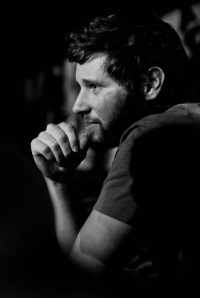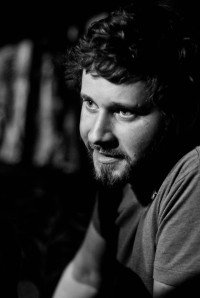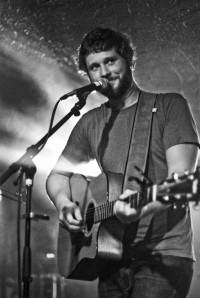 Dan and I have had a friend in common, slam poetry world champion Shane Koyczan, for years. The two of them have played multiple shows together, but things have always come up and I’ve always missed out on meeting him. After what seems like two years, we finally sat down.
Dan and I have had a friend in common, slam poetry world champion Shane Koyczan, for years. The two of them have played multiple shows together, but things have always come up and I’ve always missed out on meeting him. After what seems like two years, we finally sat down.
Adrian Markle: First off, Congratulations on winning XM Verge’s Artist of the Year. What does an award like this mean to you? Also, Said the Whale, who you’re playing with tonight, was also nominated. You guys talk about it?
Dan: All my money was on Joel Plaskett. Investing in a career, and gong further into debt for a long time…something like this is amazing, and the huge intensification of publicity. It couldn’t be timed any better: just before a national tour. I’m still coming down to earth and trying to put it into perspective. It’s a blessing.
Tyler [from Said The Whale] and the guys, we were partying together. I would have been equally been as happy for them. I’d considered myself the bottom-of-the-barrel underdog.
I’d mention it in my mail-outs, but I just never even considered myself in the running, so it was just this kind of throwaway thing. When I found out I was in the top five, I was amazed. Somebody at XM must have been rooting for me.
I paid off a lot of debt. I think what I’m going to do is purchase a touring vehicle of some kind. My whole life I’ve been biased against SUV’s but now . . . I mean I’ve inherited a Volvo wagon, but I think the first car I’ll buy will be an SUV, for touring. It’s either a Van or an SUV, and my family is safety-first. My mom lost a couple friends in car accidents, and we’ve been driving Volvo’s ever since.
AM: Nice Nice Very Nice, has gotten a lot of brilliant reviews since its release. Are you surprised at how popular it’s getting, or could you tell you were on to something when you were writing it?
Dan: It’s funny. I mean, there’s a difference between hopes and expectations, you know? I obviously had my hopes, my “it would be nice” moments, but at the same time I had what I thought what were very realistic expectations. I couldn’t even listen to it for two months. Then these reviews started coming out. It’s been an incredible wave of momentum, and the XM Verge award is just the cherry on the cake.
The most important thing is not to get this sense of entitlement. You can’t get comfortable and expect this to keep happening. It’s really important to me to not make the same record twice, and just keep pushing for this new level of artistic integrity. CBC radio three, The Peak, and The Verge are these amazing assets that have been so helpful to me and so supportive, which I’m thankful for. I’m also trying to keep aligning myself with bands like Said the Whale, awesome friends. It’s a matter of continuing to grow with these peers so I can try and keep this thing up.
AM: The Vonnegut reference, and a lot of the lyrics, especially in Robots makes me feel like there’s something you’re trying to say with this album.
Dan: I don’t know if there’s something specific I’m trying to say, but as we get further into technology, it’s just going to be increasingly important to not forget about human relationships. I think Vonnegut had an incredible way of pointing out our absurdities in a very endearing and huggable way. I just have so much respect for him. The title was a tribute to him, but I was worried that people were going to think it was a Borat reference. The poem that it comes from is an incredible summation of human nature in something like ten lines. He puts the most complex things in 2 lines, then makes you laugh about it.
be increasingly important to not forget about human relationships. I think Vonnegut had an incredible way of pointing out our absurdities in a very endearing and huggable way. I just have so much respect for him. The title was a tribute to him, but I was worried that people were going to think it was a Borat reference. The poem that it comes from is an incredible summation of human nature in something like ten lines. He puts the most complex things in 2 lines, then makes you laugh about it.
AM: How was this recording session compared to the last?
Dan: It was a great experience recording in Toronto. I worked with a guy, John Critchley. And he’d recently helped produce Mountain Meadows with Elliot Brood, who I toured with. I sent him a big batch of demos, and he really took the time to listen and to get into the depth of them. He was really dedicated. We started bringing in all these people… There were a bunch of people who I really wanted on the record, and they mostly all just said “yeah!” and showed up. It was great having all those talented people around. It made my life way easier. My method, from day one, has just been to surround myself with people who were better than I am. I think it’s the best way to grow.
AM: You’ve done some work with our mutual friend, Shane, and you’re working to develop relationships with other local musicians in the same areas as you. Do you want to talk about local community?
Dan: There’s an incredible thing happening in Vancouver right now. When I first started making music it was hard to get a band to even say “hello” at a gig. There was no community, everyone was out to get each other. In the last five or six years though, there’s arisen this incredible supportive collective of people trying to take this what we have and push it elsewhere, to show it to the world.
I’ve been friends with Shane for a while and that was the first major collaboration I’ve done I think. It was nice to finally kind of lay it down on tape. We’d been playing shows for a while. To be working with him is amazing. In a lot of ways he’s been a little bit of a mentor. Our art is different, but I still think we can learn from each other.
AM: Do you like playing big festival shows, where not everyone is going to know your work, or smaller headlining shows? Why? What’s your favourite thing about playing a festival? Least? Your favourite show/venue you’ve played?
 Dan: Both are important. You kind of have to do one to do the other. With no history, you can’t sell either kind of show. You can’t really get to a point where you can headline without spending your time in the festival scene. Any solid career to a path requires both. You plan a festival tour in the summer, and then in the fall you follow it up with a bar tour.
Dan: Both are important. You kind of have to do one to do the other. With no history, you can’t sell either kind of show. You can’t really get to a point where you can headline without spending your time in the festival scene. Any solid career to a path requires both. You plan a festival tour in the summer, and then in the fall you follow it up with a bar tour.
It’s a real gift, to play a thing like this. It’s kind of like opening for a big band in town.
I love a venue that caters to making a connection between the audience and the stage. You can be at the Orpheum and feel like it’s an intimate show, or be in a dingy little bar with a hundred people and feel nothing. A loft of bars like the idea of live music without putting the thought and effort into creating a good atmosphere. My favourite venue is probably the Vancouver East Cultural Center, or the “Cultch.” It feels like someone’s living room. People walk in ready for magic, whereas people might just walk into a bar to get shitfaced.
AM: You draw comparisons all the time to Nick Drake and Damien Rice and others. While it’s always meant as a compliment, or to try and explain your music to someone who hasn’t head it, does that ever feel weird to you, to be described as someone else?
Dan: Generally I think all journalists have to compare things because they have to put you into a context that helps people understand without having heard you. I get it. But it can be frustrating, even when it’s meant as a compliment. I really don’t want to just be known as a singer-songwriter-folky kind of thing. I’d like to be more dynamic and change and play interesting, relevant music all the time. I don’t want to get down on other artists who are of that type, because I’m totally in that world, but I like to straddle the Alt, Folk and Indie rock worlds all together.
Ultimately you just have to be as dynamic as you can be and people will say what they will. I’m not saying I don’t care, but you have to understand that when people trash you it’s not personal. I try and take in my good and bad reviews the same way. It helps me sleep at night if I don’t listen too much to the bad reviews, though thankfully I haven’t been getting too many of those lately.
AM: You stream for free almost every song you’ve ever released. You want to give me your thoughts on what this means for the future of the industry, and how you feel it helps or doesn’t help you as a musician?
I feel like if people want something, they want to have it as easily and efficiently as possible. If that means they download it, then they do. If someone downloads music for free, you can call it stealing, but if that downloaded track compels them to go to a show and maybe buy a shirt, then it’s all good. I’m all for file-sharing.
It’s all about getting it out there, and at the end of the day if you can be successful touring, then you’re successful. Putting it on my website means they don’t have to look, and at least I can keep people in the loop.
I think the way the industry is going, the internet has really evened out the playing field. We’re going to have less Coldplay’s, and more club filling acts. The bars will be full, and the stadiums will be empty. There’s an emerging middle class of working musicians. It used to be either superstars or no-ones. I guess now it’s still about “making it,’ but only in your own terms. Fame and wealth should be the side effects, or the consequences, of a good career. Generally what you should be after is just a financially comfortable career where you tour like crazy and try and have a good time without forgetting that it’s all about the music.
—Adrian Markle
photography by Casey Bennett
Leave a comment